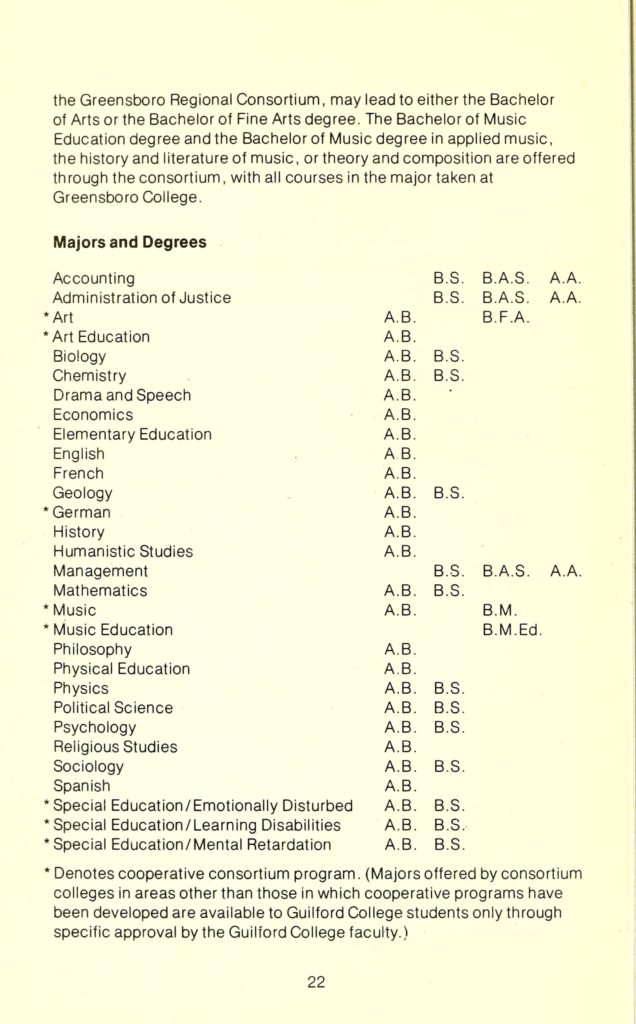I graduated Guilford College in 1979 with an A.B. I had a double major in Political Science and Economics. The basic cost for attending Guilford in 1978-79 without any financial aid was $4,280. This included tuition, room, board, and fees.
Today in 2020, the cost has risen to $52,920 and it will be higher in the next school year. The inflation rate from 1979 to 2020 is an average of 6.325% annually. By contrast, the average inflation rate based upon the Consumer Price Index from 1980 to 2020 is 2.92%.
What brought this up was an email I received on Friday from Guilford College with a letter from Interim President Carol Moore. It told how the school was revamping and retrenching. Many majors would be eliminated and tenured faculty was being let go.
To be frank, after reading the email I was appalled. I was appalled by what she decided were the essential majors going forward. Mind you, Guilford College is a liberal arts college which used to provide a well-rounded education. The science departments were well known for sending on graduates to industry, to PhD programs, and to med school. The social science departments had a reputation for placing graduates in law and graduate schools.
Here is the list of majors and concentrations in 1978-79 taken straight from the college catalog:

Concentrations were offered in classics, environmental sciences, history of science, non-western studies, and social services.
There were also cooperative 3-2 programs which allowed students to do three years at Guilford and two years at other schools to receive dual degrees. These included engineering with Georgia Tech, environmental and forestry sciences with the School of Forestry at Duke, medical technology with Wake Forest’s Bowman Gray School of Medicine, and the physician assistant’s program also with the Bowman Gray School of Medicine.
Fast forward to Friday and this is what is being proposed as majors going forward:
With respect to specific programs, I have recommended that the College offer 23 majors:
African and African American Studies
Art
English and Media Studies
– Creative Writing (track)
Experience Design
International Studies
Music
Theatre Studies
Women’s, Gender, and Sexuality Studies
Accounting
Business Administration
Criminal Justice
Education Studies
Integrative Studies
Psychology
Sport Management
Biology
– Forensic Biology (track)
Computing Technology and Information Systems
Cyber and Network Security
Environmental Studies
Exercise and Sport Sciences
Health Sciences
Public Health
Sustainable Food SystemsMany other courses of study will be available as minors or as courses to support the general education program.
I had to look up on the current college website some of these majors. Experience design? Integrative studies?
Turns out “experience design” is a fancy term for graphics arts and “integrative studies” is a make your own major thing.
I’m not even going to get into the majors in “grievance studies”. I do find it odd that a school founded by the Society of Friends (Quakers) no longer has a major in Religious Studies or even Philosophy. Given the Quakers are pacifists, it is even odder that Peace Studies has bitten the dust.
What I am seeing is a mixture of fluff and trade school majors with the occasional true liberal arts major left as a sop to traditionalists like me. Many of the majors like public health, exercise and sports sciences, and “sustainable food systems” are better offered at public universities which have more depth at a lower cost. If I wanted to be an organic farmer, I’d be going to an ag school and not a liberal arts college.
Pardon me if I feel a little saddened by all of this. I still believe in the value of a true liberal arts education. It is and has always been a bedrock of becoming an informed citizen who can critically think, cogently express ideas, and discern fact from fiction.
Fortunately, it seems alumni and students are not taking this lying down. A Facebook group called Save Guilford College has been formed and has grown to over 2,300 members in little more than a week.
What happens next will be up to the Board of Trustees.
As for me, I’m just glad I graduated when I did. It is a sad thing to say that you wouldn’t attend the current iteration of a place you spent four really good years.
